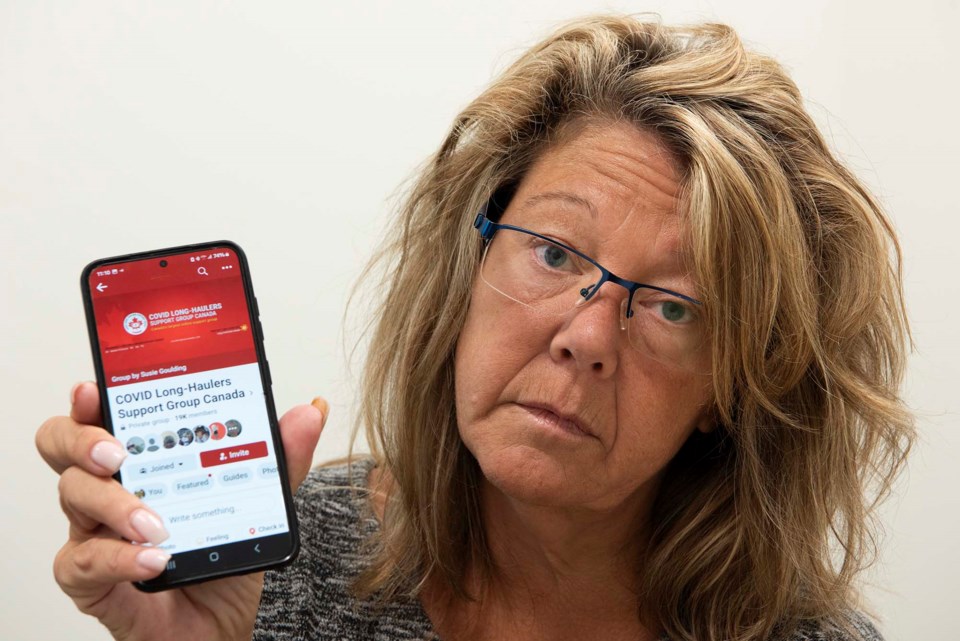A St. Albert woman says she fears the province’s move to close public long COVID care clinics will leave patients like her stumbling in the dark when it comes to getting help.
Alberta Health Services (AHS) sent out notices in early August to doctors and patients that it had ended its Long COVID Inter-Professional Outpatient Program as it was no longer being funded.
Long COVID or post-COVID-19 condition is a condition where symptoms of COVID-19 persist more than 12 weeks after infection, Health Canada reports. Common symptoms include fatigue, shortness of breath, and many others. There are currently no diagnostic tests or treatments available for it, although there are ways to manage its symptoms.
The closure means the province’s four long-COVID clinics (three in Calgary and the Kaye Edmonton Clinic in Edmonton) will no longer be accepting referrals.
The Gazette was unable to determine the number of patients affected by these closures.
In an email, AHS spokesperson James Wood said the clinics were established in 2021 as a temporary measure. He could not provide details on the number of patients affected by this closure.
Grace Lam, the co-director of the Kaye Edmonton Clinic, referred questions on patient numbers at the clinics to AHS. When asked if it was accurate to describe the number of patients at the clinics and on their waiting lists as in the “hundreds,” she said, “It’s more than that.”
An article in the U of A’s Folio said the Kaye Edmonton Clinic saw about 800 patients and had some 1,500 referrals between June 2021 and April 6, 2023.
About one in nine Canadian adults (3.5 million people) have or have experienced long-term COVID-19 symptoms as of December 2023, Statistics Canada reports.
Patients left adrift
St. Albert resident Jennifer Kendall was one of the many people affected by the closures, and said she was shocked by the news.
“A lot of doctors don’t know what long COVID is, but the clinic does,” she said, making it one of the few places patients could receive proper care.
“They’re taking away resources from us.”
Susie Goulding, the founder of COVID Long-Haulers Canada (Canada’s largest online long COVID support group), said Alberta is one of many provinces now closing its long COVID clinics.
“It’s really distressing and really stressful,” she said.
“To have this one beacon of hope disappear is devastating for many people.”
In an excerpt of an email on the closures shared with the Gazette by Caleigh Clubine, spokesperson for the St. Albert and Sturgeon Primary Care Network, AHS said patients being treated at the clinics would receive transition plans from their care teams, while patients on the wait lists would be notified of the closure by the end of August and given a list of self-care resources.
“Essentially, patients are being returned to their family physician for continuing long-COVID care,” Clubine said, who added there are no doctors accepting new patients in St. Albert.
Long COVID has over 200 symptoms and requires special training to diagnose and address, Goulding said — training most general practitioners do not have.
“It just feels like long COVID is being swept under the carpet.”
Ruins lives
Then a grocery worker, Kendall said she first got COVID on May 8, 2021. It started with her losing her sense of taste and smell, and led to fevers, colds, delirium, and pneumonia. Because of COVID-19 restrictions at the time, she spent much of this time alone at home.
“It was a little bit scary,” she said.
Kendall said she returned to work that June but had to leave and go on disability by September because of ongoing COVID symptoms, including vertigo, confusion, and panic attacks. Hiking became impossible, and her usual three-kilometre walk to work left her exhausted. She had to sell her house as she could not take care of it anymore.
“It’s frustrating because people don’t understand what you’re going through,” she said.
“They think, ‘Oh, it’s just the flu, you’ll get over it,’ and you don’t.”
Unlike her regular doctor (who said she had a mental disorder), Kendall said staff at the Edmonton clinic were able to diagnose and help her learn to live with long COVID.
While she was able to sign on with a private long-COVID clinic, Kendall said she was concerned about other patients who are now “lost in the dark” by the closures.
“I feel for those people who are not going to have those resources.”
Kendall said Alberta needs more long-COVID clinics, adding that having a one-stop shop for diagnosis and treatment (instead of having patients bounce from doctor to doctor) would free up capacity in the health care system.
Kendall said her symptoms are better today than they were three years ago, and she holds out hope for a cure that would let her get back to hiking.
“I’m going to get back up on that mountain … I never lose hope.”
Visit albertahealthservices.ca/topics/Page17397.aspx for support on long COVID.




